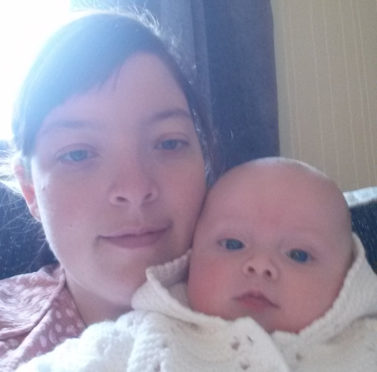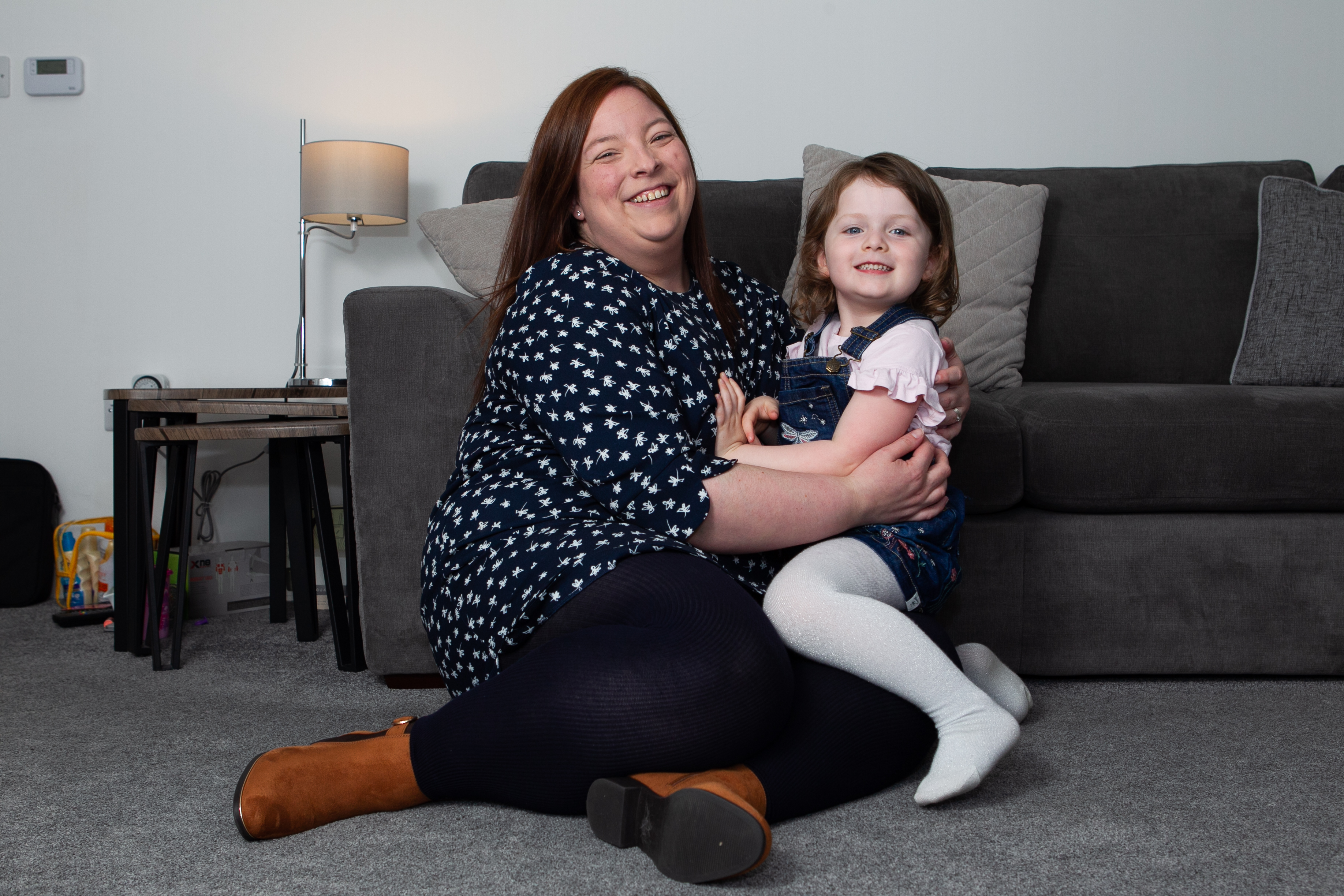
The moment a mother is handed her newborn baby for the first time should be a life-changing occasion.
For Lauren Tonner, cradling her baby, it felt like she wasn’t even involved.
“For the first few weeks of my baby’s life, I didn’t love her,” Lauren said from Glasgow.
“Now, she’s my absolute world and I feel incredibly guilty, but it’s important to remember I was ill.”
Lauren, 32, suffered from postnatal depression, a mental illness affecting 10%-15% of new mums.
And she opened up to The Sunday Post ahead of Postnatal Depression Awareness Week about those dark early days.
Having a family had always been part of the life plan for admin worker Lauren and husband Gerald, 33.
“I always wanted to be a mum,” she said. “We planned to have children and said we would like to have two.
“But from the moment I fell pregnant I was ill.”
Vomiting countless times every day, Lauren found pregnancy tough from the very beginning.
At 15 weeks, she was diagnosed with hyperemesis gravidarum, the same pregnancy condition suffered by Kate Middleton, which causes serious nausea and sickness.
“I was constantly sick and tired,” she said. “Trying to go to work and keep going with life was a struggle.
“I couldn’t even hold water down. I was throwing up every 15 minutes.”
At the worst point, when she should have been gaining weight in her pregnancy, Lauren lost a stone and a half and ended up in hospital.
Medication helped with the vomiting, but, when the time came for the baby to be born, there were complications.
High blood pressure and reduced movement meant Lauren had to be induced.
And, after a dip in contractions, she was rushed into theatre for an emergency Caesarean section in a bid to deliver the baby safely.
But when she came round from the anaesthetic with baby Sophie in her arms, the new mum felt anxious.
“It was all quite surreal,” she said.
“I woke up and someone was handing me a baby.
“Part of me felt like I hadn’t given birth because I wasn’t technically there.
“I didn’t witness it. I was like a spectator in my own life.”
For the next few days, Gerald was left holding the baby.
“He did everything for her – feeds, changes,” Lauren said.
“I used the excuse I was supposed to rest after the surgery.
“But he pretty much took care of Sophie single-handedly for the first few weeks while he was on paternity leave.
“I just didn’t feel a connection with her. I would put a face on when people came to visit, as if to say ‘This is my baby and I love her’.
“But as soon as the door was shut and it was just the three of us, I let Gerald get on with it. When he went back to work, I would look after Sophie but hand her back to Gerald when he got home and go and hide in another room.
“I didn’t go to any baby groups. I couldn’t be around other parents.
“I didn’t want anyone else to see that I wasn’t coping.”
About a month after Sophie’s birth, Lauren confided in her health visitor.
“Gerald realised early on that things weren’t right. I think he knew before I even knew.
“I have always been a bubbly person and the more social one out of the two of us.
“But, after Sophie was born, I shut off. I wasn’t seeing anyone.
“During one health visitor appointment, he had written something on a piece of paper to give to the health visitor as she left. I stopped him walking her to the door so he couldn’t pass the note on.
“But she probably knew. One of my friends had a baby and seen her health visitor once. Mine was coming every single week.
“One day, I just blurted everything out.
“She helped me get diagnosed and put on medication.”
After a month, Lauren felt better and the doctor took her off the antidepressants.
But, two months later, the symptoms of postnatal depression were back and worse than ever.
“I was all over the place, I was a crazy person,” she said. “The mood swings were ridiculous – and the paranoia.
“I was convinced someone was going to steal Sophie. If anyone came close to us in the street, I would run.
“I worried about my ability to parent, like a lorry coming along the road and the pram slipping out of my hand or falling down the stairs while carrying her.”
This time, Lauren was referred to an organisation called Bluebell for counselling. And she immediately started to feel better.
“It just reminded me that I hadn’t done anything wrong for this to happen to me,” she said.
“It’s an illness. There wasn’t anything I could have changed.
“I went back to work when Sophie was about nine months old. And that’s when I felt like Lauren again. It was like a switch being flicked. I had another purpose. I wasn’t just mum.”
The experience led Lauren to set up Glasgow South PANDAS, a support group to help other women through postnatal depression.
It’s the same charity Stacey Solomon turned to recently after struggling with anxiety following the birth of son Rex.
“I just want people to know they’re not alone. There are people you can talk to – and it’s okay to feel that way.”
The group, which recently celebrated its first anniversary, has been such a success that Lauren hopes to help set up more across the country.
It’s a huge task, but one she’s ready to take on, as well as making up for lost time with Sophie, who is now four years old.
“Sophie is my world, I just couldn’t live without her. We have a great relationship,” Lauren said.
“But I’m still recovering.
“It’s not as simple as saying a year after you have a baby, you’re not postnatal any more.
“Some people don’t even realise they’re unwell until after a year.
“It can be hard to distinguish between the difficulties of parenting and being ill.
“Thankfully, Sophie was too young to know what was happening. So I need to put it to bed, and leave it there.
“It takes time, but I’m working on it.”
She added: “It was horrendous, but in a way I suppose it has made me stronger – and the love I have for my daughter unbreakable.”
X Factor star Stacey Solomon has been upfront about issues with anxiety and postnatal depression since giving birth to her third son, Rex, earlier this year.
The Loose Women panellist, who suffered with the condition after giving birth to her first son Zachary, now 11, revealed on Instagram that she’s struggling with “crazy” thoughts since the arrival of her first child with TV presenter boyfriend Joe Swash.
The now mum-of-three revealed she regularly asks for support for her mental health from charities such as PANDAS and Mind and encouraged her fans to do the same if they were struggling.
In March, First Minister Nicola Sturgeon announced more than £50 million to improve access to mental health services for expectant and new mothers. Since the announcement, the Perinatal and Infant Mental Health Programme Board, chaired by Hugh Masters, has been established and has already met three times.
A Scottish Government spokesperson said: “We are supporting the voices of those with lived experience to be represented on our Perinatal and Infant Mental Health Programme Board, as well as in shaping and developing this ambitious programme of work.
“The programme board is currently developing a delivery plan setting out actions to take over the next four years, and this will be published in due course.”

Enjoy the convenience of having The Sunday Post delivered as a digital ePaper straight to your smartphone, tablet or computer.
Subscribe for only £5.49 a month and enjoy all the benefits of the printed paper as a digital replica.
Subscribe © Andrew Cawley/DCT Media
© Andrew Cawley/DCT Media